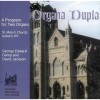传记
Craig Sellar Lang (13 May 1891 - 24 Nov 1971) was a New Zealand-born, British-domiciled organist, music teacher, and composer.
Born in Hastings, New Zealand, Dr. C. S. Lang (as he is generally known) was educated at Clifton College, and studied with Sir Charles Villiers Stanford at the Royal College of Music. He then worked as Director of Music at Christ's Hospital school in Horsham, West Sussex, from 1929, where the choristers of Westminster Abbey were briefly evacuated to during the Second World War. Lang resigned from this post in 1945 in order to devote more time to examining and composition.
His choral music includes service settings (such as the Magnificat and Nunc Dimittis in B flat, Op.16), and anthems such as He shall give his angels charge over thee (1941). There are also many anthems for trebles' voices, composed for use at Christ's Hospital, as well as numerous secular choral works.
Lang's best-known work is his Tuba Tune for organ, Opus 15, a favourite of recitalists. This dashing little piece, which owes its title to the boisterous melody sounded forth on the organ's tuba stop, begins in the style of Handel but, in its central section, has some brief key changes that could belong to no century except the 20th. Lang's numerous other works for organ include a lengthy Sonata in D minor (Op. 47, 1947), the Introduction and Passacaglia in A minor (Op.51, 1952), the Fugue-Trilogy on E.G.B. (Op. 58, 1952), and many hymn preludes and sets of preludes and fugues.
Lang's instructional works, aimed at students, were highly influential. Generations of organists were brought up on his Harmony at the Keyboard, Exercises in Score Reading, as well as his books entitled Exercises for Organists, designed to prepare organ students for the keyboard tests of the Royal College of Organists' diploma exams.








![Great European Organs. 50-Hans-Otto Jacob [Frankfurt Imperial Cathedral]](http://static.classicalm.com/repository/collection-cover/small/939-img1342105897166212.jpg)